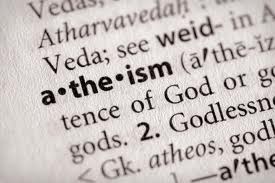A New Book on Atheists
Duane McClearn
In recent years a spate of books has been produced addressing the veracity of God or the morality of religion (sometimes Christianity, in particular), or both. Several of these books have enjoyed tremendous popularity, attesting to the fact that there is a keen interest, at least in some sectors of the public, in critically examining the tenets and practices of religion.
For instance, in “The God Delusion” (2006), noted biologist Richard Dawkins argues pointedly against the existence of God. His positions are grounded in logic and science; he roundly condemns the inconsistency, irrationality, and hypocrisy of those who embrace religion. Beyond this, he shows that religion is inherently lacking in morality, and specifically that religious believers are less moral in their thinking and behavior than atheists.
and behavior than atheists.
Quick on the heels of “The God Delusion” came “God is Not Great” (2007) by essayist and oft-ascerbic gadfly Christopher Hitchens. He takes much the same approach as Dawkins in first arguing against the existence of God, and then against the higher morality of the religious believer. The subtitle to his book, “How Religion Poisons Everything,” is a telling indication of the views expressed in the text.
A.C. Grayling, in his very recent book “The God Argument” (2013), puts forth a philosophical and scientific rationale for denying the existence of God. He refutes one by one the debating points of Christian believers. He also argues for the moral superiority of secular atheism over religion.
In the vein of morality, Jack David Eller takes several religions to task in “Cruel Creeds, Virtuous Violence” (2010). As the title connotes, this work details the tremendous suffering perpetrated in the name of God or religion. Sometimes the motivation cannot be mistaken, for the atrocity is dictated by God himself, as when the Israelites are commanded to slaughter all their enemies, including babies, and show no mercy in doing so.
In “Crazy for God” (2007) author Frank Schaeffer recounts, among other things, his extensive associations with members of the Christian right, particularly within the evangelical movement. He describes his disillusionment with the leaders of the movement, decrying their hypocrisy, mean-spiritedness, and propensity for self-aggrandizement. He faults the leaders as well as the run-of-the-mill believers with a failure to consider deeply the ramifications of their beliefs. Ultimately, he converts to the Greek Orthodox Church, considering it to be truer to the ideals of Christianity. Thus, although critical of many facets of Christianity, at least as practiced by many in the mainstream, he does not reject Christianity outright.
Dan Barker was an evangelical preacher who describes his rejection of Christianity (and religion more generally) in “Godless” (2008). Currently he is one of America’s leading and most outspoken atheists. His book describes his personal odyssey from devout believer, through many stages of questioning his faith, to his ultimate conclusion that there is no God. He argues that the Bible and Christianity, far from being guiding lights for proper behavior, are fundamentally immoral. He further takes the position that atheists can (and do) lead moral, happy, and fulfilling lives.
One aspect of atheism that has been relatively unexamined is the thinking of everyday atheists, as opposed to high-profile religious figures who have turned away from one or more features of religion (such as Schaeffer and Barker). The current project, undertaken by Tom Arcaro, Chrys Stevenson, and me, seeks to fill that void. Tentatively titled “The Atheist Next Door,” it has as its goal not to argue against the existence of God, as has been done forcefully and eloquently by Dawkins, Hitchens, and Grayling. Its point is also not to attack the morality of the Bible or religion more generally, as has been done by Eller, Barker, and Shaeffer, as well as Dawkins, Hitchens, and Grayling. Rather, it seeks to describe atheists primarily in their own words, although it adds force to its observation by the use of statistical analyses. And the number of atheists it describes is huge—approximately 8,000 self-described non-believers from dozens of nations responded to a lengthy survey about their attitudes toward religion, reasons for embracing atheism, and problems associated with being a non-believer.
(Very) preliminary examination of the results shows that atheists have felt quite stigmatized for their beliefs, and degraded in society. Many who have not been open about their atheism fear that their beliefs will become public knowledge. The atheists in our sample indicate that they feel that they are just as moral as religious people, if not more so. They also feel that they lead reasonably happy and productive lives, in spite of being stigmatized. They do not for the most part report a huge gap in their lives without religion. All in all, the atheists in the study come across as being normal people—they have normal jobs, seek normal pleasures, and have normal expectations. The stigma that believers so often place upon atheists turns out to be misplaced and undeserved.


With me it was simply unbelieveable. Born Atheist, I rejected santa,easter bunny & religion.That was 80 years ago.